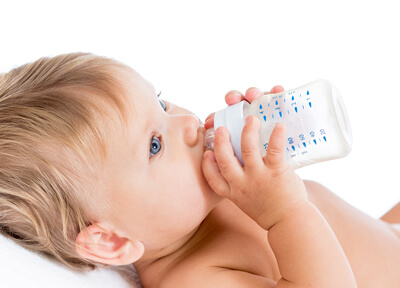Avoiding the Baby Bottle Blues
 When it comes to thumb sucking, babies are naturals — maybe because they practice even before they are born. Children begin sucking on their thumb while in the womb to develop the skills necessary for breastfeeding. Not surprisingly swapping a thumb for a pacifier or baby bottle is an easy transition for many kids.
When it comes to thumb sucking, babies are naturals — maybe because they practice even before they are born. Children begin sucking on their thumb while in the womb to develop the skills necessary for breastfeeding. Not surprisingly swapping a thumb for a pacifier or baby bottle is an easy transition for many kids.
In a child’s first few years, pacifier use generally doesn’t cause problems. But constant, long-term pacifier use, especially once permanent teeth come in, can lead to dental complications. Constant sucking can cause top front teeth to slant out, and bottom front teeth to tilt in. It also can lead to jaw misalignment (such as an overbite) and a narrowing of the roof of the mouth.
It is generally advised that children stop or drastically reduce their pacifier use around age 3. If a child is dependent on the pacifier to be calmed and soothed, try giving it to him or her only when absolutely necessary and using positive reinforcement to wean them off the habit.
Many children also use a baby bottle longer than necessary. Apart from the risks associated with the sucking motion, bottles also carry a heavy risk of promoting tooth decay if they contain anything other than water.
Frequently sucking or sipping on milk or juice from a bottle over an extended period of time will increase your child’s risk of tooth decay. When sugars and carbohydrates come in consistent contact with teeth they create an environment for decay-causing bacteria to thrive. Tooth decay can lead to painful infection and in extreme cases children may need to have a tooth extraction or dental treatment to extensively repair damaged teeth.
Long-term use of pacifiers and bottles can lead to speech and dental problems as your child gets older. Since children develop at different ages, it is a good idea to speak with your dentist and pediatrician to make sure that your infant or toddler’s early oral habits don’t cause problems.











